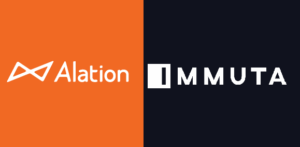
Sometimes you compete, and sometimes you cooperate. In the case of Alation and Immuta, the two companies today are celebrating a new partnership that will see them cooperating to help customers benefit from their respective strengths.
Alation is best known known as a provider of enterprise data catalogs, those user-facing indexes that allow data analysis and data scientists to find useful and vetted sources of data for experiments and production use cases. In fact, the company is widely considered to be the forerunner in that product category, although it has dabbled a bit on the data governance side, too.
Immuta in some ways is the opposite. The company comes from the world of data governance and controlled data access–in fact, its founders, Matt Carroll and Steve Touw, came from the federal arena, which knows a thing or two about provisioning access to sensitive data. But Immuta has also moved more into user-facing roles, particularly with its new data marketplace solution, which resembles a data catalog.
This is what makes today’s news interesting. Instead of competing, the two data vendors have entered into a partnership that recognizes their respective strengths–data catalogs (or marketplaces) for Alation and data governance and policy enforcement for Immuta.
Thanks to the heightened cooperation (one might even call it “co-oppetition”), organizations that rely on Alation’s Data Product Marketplace can now benefit from a streamlined integration to Immuta’s data access approval workflows and policy enforcement engine. That will give data consumers a unified experience (i.e. the Alation user interface) and eliminate the burdensome minutia of approvals that can slow projects to a crawl.
Finding the data is only half the battle, Immuta CEO Carroll says; actually delivering the data into the hands of data professionals without violating company policies or security is where things tend to break down, he says.
“We’re streamlining the entire process–from discovery to access decisions–by eliminating the bureaucracy that slows data down,” Carroll says in a press release. “Too many people need to approve too many things. We make it simple and fast by using a combination of birthright access and request workflows, powered by AI, to automate most decisions and route the rest to the right person. And unlike others, we don’t just approve–we actually provision the data.”
Organizations that have relatively small teams or simple data stacks probably don’t need either of the two vendors’ products. After all, you can get a metadata-enabled data catalog for no extra charge on all of the major cloud platforms, including AWS, Google Cloud, Databricks, and Snowflake. Similarly, every cloud platform has its own policy enforcement engine.
The challenge comes when organizations have larger teams or individuals using multiple data platforms and perhaps also on-prem systems. In these situations, it’s often good to have an independent vendor dedicated to keeping track of thousands of curated data sets residing across all of the data silos (Alation’s job) on the one hand, while also ensuring that people who are entitled to access the data can actually get to it while those who aren’t entitled to access it in fact are blocked from viewing it (Immuta’s job).
Offering integration between the two vendors’ products will deliver better data faster while eliminating tradeoffs, according to Jake Magner, senior director of product management at Alation.
“Bringing together Alation’s metadata-driven discovery with Immuta’s dynamic policy enforcement means users can now find and access trusted data in one seamless workflow,” Magner stated. “It is a significant step forward for data teams aiming to scale governed, AI-ready access across the enterprise.”
In a blog post, Alation and Immuta executives provide more information about their new partnership, including how it helps to operationalize one of the most impactful data management theories of the past decade: the data mesh.
“With this integration, Alation becomes more than a data catalog–it’s a governed digital storefront for trusted data products. Each data product is discoverable, explainable, and securely accessible,” write Alation employees Anthony Lempelius and Chloe San Nicolas and Immuta’s Touw. “And Immuta becomes more than a data provisioning platform–it instills trust and confidence in data product utilization, ensuring that what is accessible is also authorized and auditable.
On September 24, Touw and Manger will be hosting a joint webinar discussing the integration between their two products and what it means for customers. You can read more about it and register here.
Related Items:
A 60% Accuracy Leap? Alation Ties AI to Your Data Context
Why Immuta Is Moving Into Data Marketplaces
Alation Turns to GenAI to Automate Data Governance Tasks

